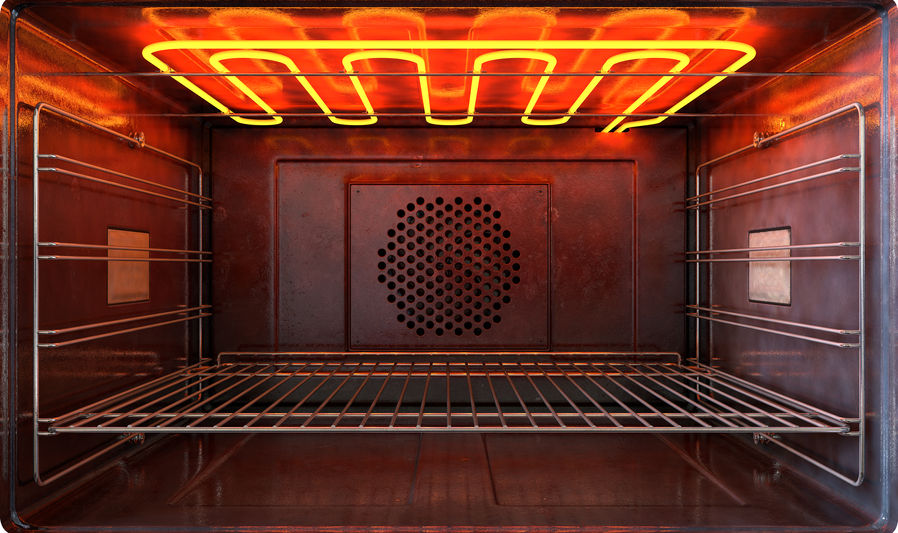There are ways to heat your home without turning on your conventional gas, oil or electric heater, but the oven appliance you cook with isn’t your best option. When the weather turns cold, a climbing heat bill can keep you from cranking up the thermostat. Keep the cold under control without using kitchen appliances to increase the temperature of your home.
View Our HVAC Services | Learn About All Air Systems
Some people are tempted to turn on their ovens and stoves when the temperatures drop into the single digits and apartment dwellers are desperate for warmth. Many people search the web wondering if using an oven to heat an apartment or home is a good idea. Kitchen ovens obviously weren’t designed with the intention of heating a home, but the idea sounds possible.

Call 732-888-0952 or Contact Us for a Free Heating and Cooling Quote in
Monmouth and Ocean County, New Jersey!
So, is it okay to use an oven to heat up your apartment? We thought, in the interest of public safety, we’d answer the question once and for all.
The Dangers of Heating Your Home With An Oven
Even in an especially brutal winter, you should not resort to unsafe methods in order to stay warm. You might think that leaving the oven door open to heat your house or apartment makes sense but you may not realize how dangerous it actually is.
Never use a Gas Oven to Heat Your Home or Apartment.
Not only is it an inefficient way to heat a large space, but it’s also very risky, and could lead to carbon monoxide poisoning, which can be deadly.
If you have a gas oven, you’re putting yourself at risk for Carbon Monoxide (CO) Poisoning if you try to use the oven for heat. Carbon monoxide is invisible, odorless, and tasteless, so you won’t be able to tell if it’s seeping into your home. Moderate levels of the gas can cause headaches, dizziness, nausea, and fainting – it can feel like you are coming down with the flu. High levels are fatal. When you use your appliances correctly, you don’t need to worry about carbon monoxide poisoning, but using a gas oven as a heater is not the right way to use the appliance.
Be aware that using a gas oven to heat your home is very dangerous and we do NOT recommend doing it. If you choose to do it anyway, understand that your oven does not have any safety features regarding depleted oxygen levels or carbon monoxide production. A gas oven can produce 800 part per million carbon monoxide for 12 hours and still be rated as safe, but air concentration levels as low as 5PPM can be dangerous. A properly tuned oven should put out no more than 50 when door is closed. But when door is opened it can potentially make dangerous levels.
Gas flames make a considerable about of water vapor, so you will notice the humidity levels rise in the home which may cause you to feel clammy and your windows may sweat. When the humidity is high you can still feel cold at 72 degrees. Heat your home more efficiently by making sure you don’t lose hot air through a chimney or vent pipes. There are vent free gas heaters available that have oxygen sensors. They will shut off the heater before the levels get dangerous and start releasing carbon monoxide. Also, these heaters have a catalitic effect that will ensure a complete burn making them more fuel efficient than an oven.
Using an Electric Oven to Heat the House
An electric oven is powered by electricity, not gas, and is safer to leave running than an older gas stove because it doesn’t emit carbon monoxide. Electric ovens frequently stay on for many hours at a time without adverse effects. High oven temperatures can heat a room, even with the door closed, though it won’t be effective in a very large space. Opening the oven door will allow the heat to move more freely into the room.
Electric ovens are not intended for space heating so, understand that it is possible for the appliance to overheat due to prolonged usage and a resulting malfunction may cause a fire. This will also cause the decrease in the lifespan of the appliance/ oven.
One disadvantage of using the electric oven to heat the house is that it will consume more energy to achieve a comfortable room temperature. Running an electric oven costs much more than running a smaller space heater. The higher the energy consumption, the higher the electricity bill will be – so this is not really a cost efficient option. The use of the electric oven to heat the house should be the last resort.
Check the wattage on the unit to know what your costs will be. The lower the watts, the lower the cost on your bill. Your monthly kilowatt hours are calculated by multiplying the wattage of the unit by the hours per day it’s running, and then dividing by 1,000. You pay your electric bill by the number of kilowatt hours used. An electric oven usually uses from 1,500 to 4,000 watts. Space heaters are available in models that use as little as 500 watts. Look for energy efficient models.
An electric oven left cracked open at the highest heat can melt temperature dials. The longer an oven is left on, the greater the chance of an electrical malfunction leading to a fire, especially if it’s left unattended. Ovens are designed to heat the small internal area where your food is cooked, not an entire room in your home.
Heating your home with an oven isn’t a smart idea, it’s an unsafe mistake.
If your furnace or HVAC system is in need of repair, call a qualified technician to come and fix it. If the problem is small, it may cost you less than running your oven on cold nights to heat your home. If you need a different heat source for a short time, try a space heater. The wattage used is much lower than that of an oven and it’s designed to heat a room. You can also try kerosene heaters, though they emit an odor. When you’re using a heating source, make sure nothing flammable is near it and that any non-electric source of heat is located in a place with proper ventilation.
